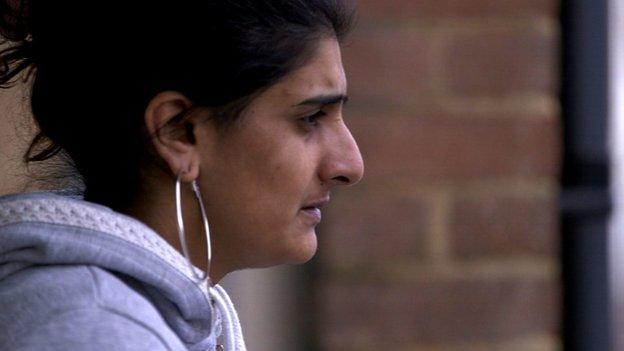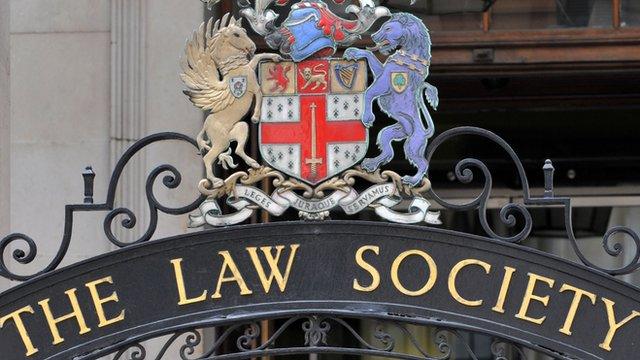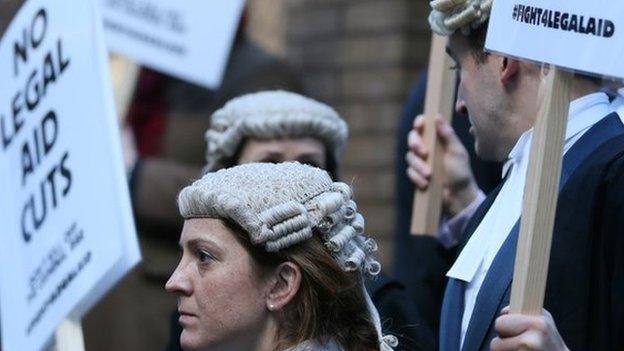Legal aid reforms 'risk serious miscarriages of justice'
- Published

For almost two years there has been a new style of justice for many people who go to civil courts in England and Wales to resolve all sorts of problems, from housing issues to claiming benefits, or to getting divorced.
The government says more civil cases could be solved before they reach court - and believes that many of those that do need resolution by a judge can be handled by people on their own, without expert help.
Under pressure to cut budgets, the government introduced sweeping changes to the provision of legal aid for a whole array of civil legal cases in England and Wales.
It also said it would reduce the annual £2bn legal aid bill by £500m, of which £350m has already been cut from civil legal aid.
Legal aid, funded by the taxpayer, used to help with the costs of professional advice for people who could not afford it.
It funded solicitors and agencies to advise people on their legal problems, such as eviction, debt and family breakdown and, if necessary, represent people in court.
The number of litigants-in-person appearing before the civil and family courts without legal representation has increased since the Legal Aid, Sentencing and Punishment of Offenders Act took many civil cases out of scope for legal aid in April 2013.
Reluctant litigant
This has resulted in many people not being able to get funding for legal representation and having to do it themselves.
Thousands of people are now going into the legal arena, not represented by a qualified solicitor or barrister, but reliant on their own abilities to argue their case and get the result they want.
Rochelle Ezekiel has reluctantly become one of these new litigants-in-person.
She has mental health problems, but she has spent the past two years fighting for residential custody of her young daughter - who lives with her paternal grandmother.
Her daughter went to stay with her grandmother following a severe deterioration in Rochelle's mental health.
She believes she is now well enough to have her daughter back.

Rochelle Ezekiel is a litigant-in-person
Under the new rules she can't get legal aid so she is fighting her own case.
She told me she has found it very emotional and stressful to represent herself in court.
"They've basically listened to everything the solicitors are saying on the other side and not listening to what I'm saying.
"I'm not a solicitor, I haven't done this before, but I have a lot to say. I'm being treated unfairly and I need to get my point across.
"I'm really emotional about what's being said. A solicitor wouldn't be so attached to the case, where as I am, that's my child."
The changes to the system have led to protests and even strikes by the legal profession.
Solicitors, barristers and judges had never taken action like this before.
But the architect of the reforms, and former justice minister Kenneth Clarke, robustly defends the decision: "The idea that legal aid, this extraordinary generous system that the British had acquired thanks to lobbying over the years should be sacrosanct, and left untouched and couldn't be reduced was not one I agreed with.
"When the financial system eases and when you don't need more money for hospitals or schools then perhaps you should start putting some back into legal aid.
"But you've got to ask what justice really requires and really means."
Labour say they plan to review the cuts in they get into office.
"We are horrified by the impact of the governments cuts to legal aid," says shadow justice secretary Sadiq Khan.
Miscarriage fears
"We are going to widen access to justice. One of our priorities will be to ensure that those women in particular who've lost out as consequence of governments changes to legal aid and domestic violence are able to get legal advice and representation.
"There are savings to be made but we voted against every single one of their proposals and we'll do everything that we can to widen justice again."
And many legal professionals disagree with the government's approach. Sir Alan Moses was a judge for 19 years and told me he is deeply frustrated that few serving judges will stand-up to publicly make the criticisms he knows many of them hold.
And he fears the cuts to legal aid will lead to dire consequences: "I'm quite certain that if you don't allow those who can't afford it, legal assistance, that more and more serious miscarriages of justice will occur.
"It seems to me inevitable that that will happen if you don't have skilled independent advocates arguing cases."

Former justice secretary Kenneth Clarke
Supporters of the changes argue that the new legal aid rules included a safety net for really deserving cases that found themselves unable to get legal aid, but believed their case was exceptional.
A discretionary scheme was introduced to allow some flexibility in the system - called Exceptional Case Funding.
Rochelle, with a mental health problem, felt she was a good candidate for exceptional funding. She applied and was turned down. She appealed - and was turned down again.
Among the legal profession there are concerns that the most vulnerable are still falling through the net.
Following the reforms there were more than 1,500 applications for Exceptional Case Funding. Only 69 were successful.
But the Ministry of Justice says the Exceptional Case Funding Scheme is functioning as intended.
Its purpose is to provide funding where it is legally needed. And it adds that every application is considered by the Legal Aid Agency on an individual basis.
The consequence of the reforms, necessary or not, is more do-it-yourself justice.
With ordinary people having to build their own court cases by constructing legal arguments - navigating through complex procedure - and assembling convincing arguments to persuade a judge.
Panorama: DIY Justice, is on BBC One on Monday 30 March at 19:30. Or watch it later on the BBC iPlayer.
- Published25 March 2015

- Published18 February 2015

- Published23 January 2015

- Published4 June 2013
